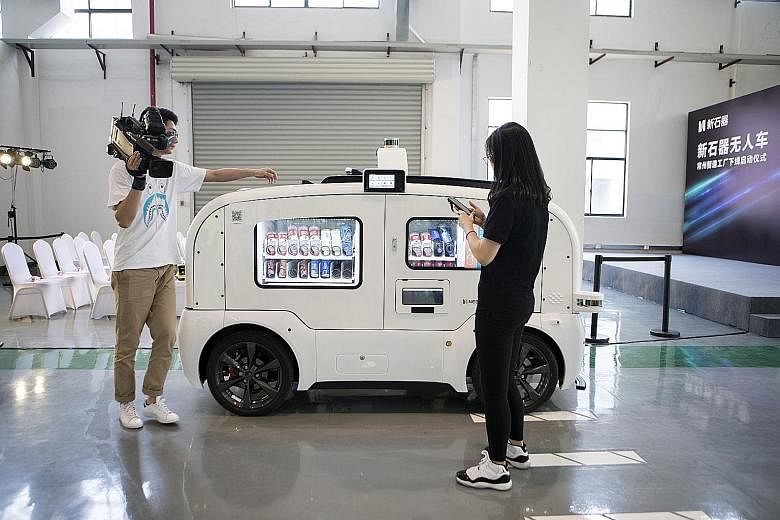BEIJING • Forget drones. The future of deliveries may be robo-vans.
A Chinese start-up called Neolix kicked off mass production of its self-driving delivery vehicles last Friday - saying it is the first company globally to do so - and has lined up giants such as JD.com and Huawei as customers. It expects to deliver a thousand of the vehicles, which resemble tiny vans, within the first year as it broadens out.
The implications are potentially huge: Billionaire Jack Ma predicts there will be one billion deliveries a day in China within a decade and the commercialisation of the technology could provide lessons for autonomous vehicles carrying passengers. Neolix is not alone in this space, as Silicon Valley's Nuro raised almost US$1 billion (S$1.4 billion) this year and is starting to deliver groceries in Arizona.
"Driverless cars will change the world, just like the shift from the carriage to the car," said Neolix founder Yu Enyuan, 45. "I have been looking for something worth fighting for with everything I have and what I am doing now is that."
He has been testing more than a hundred of the vehicles in enclosed areas such as Chinese campuses. The vehicles are priced similarly to a regular car - a Neolix van costs about US$30,000.
Mr Yu said the delivery of goods is just the start. He envisages fleets of robo-vans providing everything ranging from 24/7 mobile vending to help with running errands.
His confidence stems from the Chinese e-commerce boom that has spawned Goliaths such as Mr Ma's Alibaba Group Holding, which is valued at US$400 billion.
While people are trying to keep up and becoming more efficient with inventions such as smart lockers, there is no doubt robots are becoming an increasing threat. With robo-vans, there is no need for a messenger who will need a salary, and robo-vehicles are bound to have fewer accidents than humans.
One limitation: Either a human needs to be present to accept the package, or the vehicle has to leave the parcel at a prearranged accessible place like a ground-floor locker.
While self-driving cars that carry passengers still face significant regulatory obstacles, Mr Yu said the path has been easier for unmanned delivery vehicles. Neolix's vans are operating in the new Xiongan economic zone about 100km south-west of Beijing, as well as in limited areas of the capital and in Changzhou.
China is not the only place where robo-deliveries are emerging. In the United States, self-driving trucks are hauling mail between Phoenix and Dallas, and Nuro started a robo-delivery service with grocer Kroger in Scottsdale, Arizona, last December.
Neolix's initial production line in Changzhou has an annual capacity of over 30,000 vehicles, and it plans to set up factories overseas with partners when sales rise, Mr Yu said. It is talking to potential customers in places including Japan and the US and targets annual sales of 100,000 units in five years.
BLOOMBERG

